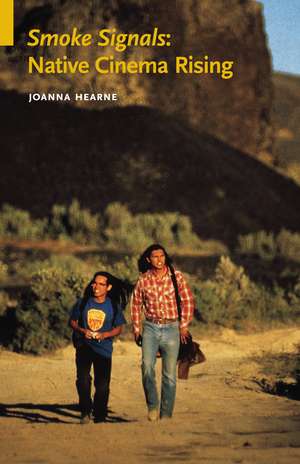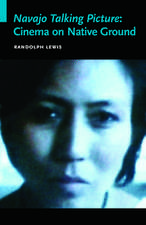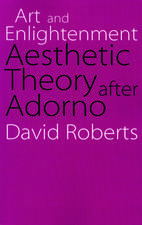Smoke Signals: Native Cinema Rising: Indigenous Films
Autor Joanna Hearneen Limba Engleză Paperback – 30 noi 2012
Smoke Signals is a historical milestone in Native American filmmaking. Released in 1998 and based on a short-story collection by Sherman Alexie, it was the first wide-release feature film written, directed, coproduced, and acted by Native Americans. The most popular Native American film of all time, Smoke Signals is also an innovative work of cinematic storytelling that demands sustained critical attention in its own right.
Embedded in Smoke Signals’s universal story of familial loss and renewal are uniquely Indigenous perspectives about political sovereignty, Hollywood’s long history of misrepresentation, and the rise of Indigenous cinema across the twentieth and twenty-first centuries. Joanna Hearne’s work foregrounds the voices of the filmmakers and performers—in interviews with Alexie and director Chris Eyre, among others—to explore the film’s audiovisual and narrative strategies for speaking to multiple audiences. In particular, Hearne examines the filmmakers’ appropriation of mainstream American popular culture forms to tell a Native story. Focusing in turn on the production and reception of the film and issues of performance, authenticity, social justice, and environmental history within the film’s text and context, this in-depth introduction and analysis expands our understanding and deepens our enjoyment of a Native cinema landmark.
Preț: 214.42 lei
Nou
Puncte Express: 322
Preț estimativ în valută:
41.03€ • 42.02$ • 34.13£
41.03€ • 42.02$ • 34.13£
Carte tipărită la comandă
Livrare economică 18 martie-01 aprilie
Preluare comenzi: 021 569.72.76
Specificații
ISBN-13: 9780803219274
ISBN-10: 080321927X
Pagini: 280
Ilustrații: 20 photographs, 1 appendix, index
Dimensiuni: 140 x 216 x 19 mm
Greutate: 0.36 kg
Ediția:New.
Editura: Nebraska Paperback
Colecția University of Nebraska Press
Seria Indigenous Films
Locul publicării:United States
ISBN-10: 080321927X
Pagini: 280
Ilustrații: 20 photographs, 1 appendix, index
Dimensiuni: 140 x 216 x 19 mm
Greutate: 0.36 kg
Ediția:New.
Editura: Nebraska Paperback
Colecția University of Nebraska Press
Seria Indigenous Films
Locul publicării:United States
Notă biografică
Joanna Hearne is an associate professor of English and film studies at the University of Missouri–Columbia and is the author of Native Recognition: Indigenous Cinema and the Western. Her articles have appeared in Screen, Western Folklore, Journal of Popular Film and Television, and edited volumes.
Cuprins
List of Illustrations
Acknowledgments
Series Editors' Introduction
Introduction: "A Way to Sit at the Same Table": Indigenizing Popular Culture
1. "Indians Watching Indians": Speaking to and from Cinema History
2. "The Storyteller Is Part of the Story": Making Smoke Signals
3. "Dances with Salmon": Reading Smoke Signals
4. "Take Your Dad's Pickup": Smoke Signals's Reception
Conclusion: "Be a Crazy Horse of Filmmaking": Smoke Signals and the Ongoing Production and Reception of Native Cinema
Appendix: Remembering Smoke Signals: Interviews with Chris Eyre and Sherman Alexie
Notes
Bibliography
YouTube Videography
Index
Acknowledgments
Series Editors' Introduction
Introduction: "A Way to Sit at the Same Table": Indigenizing Popular Culture
1. "Indians Watching Indians": Speaking to and from Cinema History
2. "The Storyteller Is Part of the Story": Making Smoke Signals
3. "Dances with Salmon": Reading Smoke Signals
4. "Take Your Dad's Pickup": Smoke Signals's Reception
Conclusion: "Be a Crazy Horse of Filmmaking": Smoke Signals and the Ongoing Production and Reception of Native Cinema
Appendix: Remembering Smoke Signals: Interviews with Chris Eyre and Sherman Alexie
Notes
Bibliography
YouTube Videography
Index
Recenzii
"Hearne's book is a cogent and valuable addition to the body of work on Smoke Signals and Native cinema. . . . Her extremely detailed reading of the film, her trenchant analysis of the strategies it uses to speak to multiple audiences, and her examination of the current state of Native cinema make this a valuable resource for both teachers and scholars."—Laura Beadling, Western Historical Quarterly











